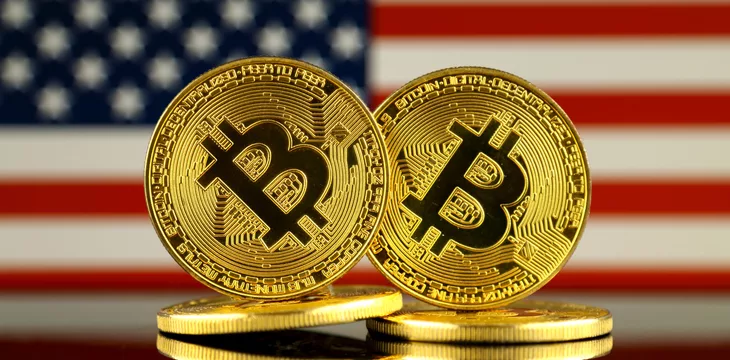|
Getting your Trinity Audio player ready...
|
Two United States senators have petitioned Securities and Exchange Commission (SEC) Chair Gary Gensler not to approve any further digital asset exchange-traded funds (ETFs), citing “enormous risks” to retail investors.
In a March 11 letter, Democrat senators Jack Reed (D-RI) and Laphonza Butler (D-CA) claimed that allowing any further approvals of digital asset ETFs would see investors exposed to “thinly traded” markets rife with fraud and manipulation.
“The SEC’s approvals have provided a green light for Wall Street to sell volatile cryptocurrency investments to ordinary Americans through their brokerage and retirement accounts,” the letter read.
“Given the significant and unique risks posed by cryptocurrency, it is critical that Americans receive accurate, comprehensive information about BTC ETPs… retail investors would face enormous risks from ETPs referencing thinly traded cryptocurrencies or cryptocurrencies whose prices are especially susceptible to pump-and-dump or other fraudulent schemes.”
Misleading terminology was a particular concern for the democrat duo, who stated that the naming and marketing of many already approved BTC ETPs appears to obfuscate important characteristics about the investments.
Reed and Butler pointed out that in the SEC filings for the new products, sponsors commonly referred to BTC ETPs as “exchange-traded funds” (ETFs). This, said the senators, was troubling because BTC ETPs are different in critical ways from mutual funds and ETFs.
An ETF is a specific type of exchange-traded product (ETP). While all ETFs are ETPs, not all ETPs are ETFs. ETP is a broader category that includes various products like exchange-traded notes, exchange-traded commodities, and ETFs, representing investment funds traded on exchanges.
Not all ETPs are afforded the same protections under the Investment Company Act of 1940 as ETFs, including fiduciary duties, limits on leverage, custody requirements, governance requirements, and examination by the SEC.
Reed and Butler argued that the use of the term “Fund” implies the full protection of the Investment Company Act, which does not, in fact, apply. Rather, the spot BTC ETFs in question have “several basic investor protections” that apply to any security registered with the SEC.
“These alarming deficiencies raise significant concerns that brokers and advisers may now provide incomplete or deceptive information about BTC ETPs to retail investors,” added the senators.
In support of this argument, the letter pointed to a January review by the Financial Industry Regulatory Authority (FINRA), which identified “substantive violations” of FINRA Rule 2210 (Communications with the Public) in 70% of digital asset communications by brokers that were reviewed.
The senators’ primary concerns related to the recently approved spot BTC ETFs, as opposed to BTC futures ETFs, which have been on the market for some time.
A BTC futures ETF tracks the price of BTC, but these types of funds don’t actually hold BTC. They hold BTC futures contracts—legal agreements to buy or sell particular assets at a predetermined price at a specified time in the future—or investments in companies involved in BTC-related activities, such as mining or trading.
In contrast, spot BTC ETFs hold actual BTC, and the ETF’s performance follows BTC prices closely. These products provide investors a way to gain exposure to BTC without needing to directly purchase and store it themselves, as well as allowing investors to buy and sell shares of the ETF on traditional stock exchanges, providing ease of trading.
The SEC was initially reluctant to give these new products the go-ahead, citing concerns similar to those raised by Reed and Butler, namely market manipulation, price volatility, custodian issues, and investor protection.
Speaking in December 2023, SEC chair Gensler said:
“There’s been far too much fraud and bad actors in the crypto field. There’s a lot of noncompliance, not only with the securities laws but other laws around any money laundering and protecting the public against bad actors there. And so I would note, this is a field where you still don’t have the fundamental information on many of these projects. And the intermediaries of the so-called crypto exchanges are commingling and doing things that we do not allow anywhere else in our financial system.”
However, a few weeks after making these comments, Gensler could no longer hold back the tide and reluctantly gave the go-ahead for the first spot BTC ETFs. The first 11 spot BTC ETFs were approved by the SEC on January 10 and launched the following day.
The pre-approval clamor for the new product was reflected in the market response to the first 11 ETFs. Since their January 11 launch, total net inflows (in the market) are estimated at $7.5 billion, and the launch has been described as “one of the most successful by trading volume and flows.”
Seeing the success of the spot BTC ETF has led to other digital assets wanting a piece of the action. There are currently eight proposed spot Ether ETF applications awaiting approval by the SEC, and there have been hopes that other altcoins could also have their day in the ETF sun.
In their letter to the SEC, Senators Reed and Butler strongly urged the SEC not to allow the recent approval of spot BTC ETFs to become a precedent for further approvals. They stated that while the market for BTC had displayed “serious weakness,” it was more established and well-scrutinized than the market for any other smaller cryptocurrencies.
“However vulnerable BTC may be to fraud and manipulation, markets for other cryptocurrencies are far more exposed to misconduct,” read the letter.
However, the senators’ concerns may be unwarranted. While the SEC was reluctant to wave through the rule changes required for a spot BTC ETF to be sold, part of the reason it eventually relented was that it could not adequately justify denial based on its view of BTC, as compared to other digital assets.
The SEC has been consistent for some time on the line that BTC is possibly the only digital asset/token that does not qualify as a security under the Howey test. This means the regulator has more sway over whether assets that it does deem securities, such as Ether and altcoins, will be allowed to hit the mainstream market via spot ETFs.
When it comes to the currently listed products, Reed and Butler also urged the SEC to take “several specific steps” to increase consumer protections, including requesting that BTC ETF brokers and advisors be subjected to further regulatory scrutiny over their communications and whether they are acting in the best interest of clients.
They also advised the SEC to ensure that spot BTC ETFs “do not use inappropriate and confusing naming conventions in SEC filings and other investment documents.”
Both Butler and Reed have been vocal critics of the digital asset space in the past, supporting legislative efforts to reign in the area.
In December 2023, Butler joined Senator Elizabeth Warren’s (D-MA) Digital Asset Anti-Money Laundering Act as co-sponsor, and in July, Reed sponsored a bipartisan bill
requiring decentralized finance (DeFi) services to abide by the same compliance rules as financial firms, in order to prevent money laundering, digital asset-facilitated crime and sanctions violations.
Watch: Here’s how BSV works as the base layer for other blockchains

 02-16-2026
02-16-2026 




